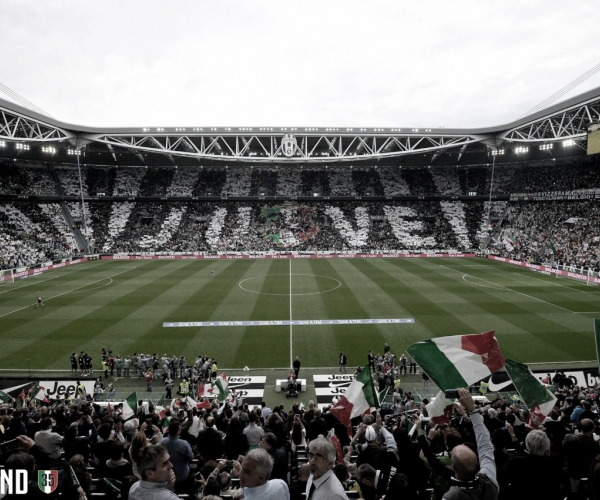
Juventus

1897 Turim
Juventus Football Club, known simply as Juventus or Juve, is one of the most prestigious and successful soccer clubs in Italy and the world. Founded in 1897 in Turin, it has been a mainstay in the history of Italian soccer, noted for its rich history, strong fan base and remarkable record. Juventus is known for its winning mentality, its rigorous tactical approach and its ability to nurture and attract some of the best talent in world soccer.
Foundation and Early Years
Juventus was founded on November 1, 1897 by a group of young local students in Turin. In its early years, the club played matches against local and regional teams, laying the foundations for what would become one of Italy's most important soccer institutions. In 1900, Juventus made its debut in the Italian league, beginning its journey in competitive Italian soccer.
During the first decades of the 20th century, Juventus gradually consolidated its position in Italian soccer. Although the early years were marked by ups and downs, the team began to show its potential and attract more prominent players. The 1920s were particularly significant, as Juventus won its first league title in the 1905 season and then moved to the Stadio Comunale, which would be its home for the next six decades.
The Quinquennio d'Oro Era
Juventus experienced one of its most glorious eras in the 1930s, known as the "Quinquennio d'Oro" (Golden Quinquennium). During this period, the club dominated Italian soccer, winning five consecutive Serie A titles between 1931 and 1935. This success was the result of a combination of excellent management, talent on the field and strategic vision in team development.
During the Quinquennio d'Oro, Juventus was strengthened by key players such as Luis Monti, Giovanni Ferrari and Raimundo Orsi, under the technical direction of Carlo Carcano. This period not only established Juventus as a giant in Italy, but also began to build its reputation internationally.
Post-War Expansion and Modernization
After World War II, Juventus went through a period of reconstruction and modernization. Although the immediate post-war years were not very successful in terms of titles, the club worked on strengthening its structure, from youth academy to management. This effort laid the foundations for future successes.
In the 1950s, Juventus returned to prominence with the acquisition of key players such as John Charles and Omar Sívori. These talents helped Juventus win several more league titles, and the club began to establish a broader fan base, not only in Turin, but throughout Italy.
The Agnelli Era and Domination in the 1970s and 1980s
The Agnelli family, known for its association with Fiat, played a crucial role in the history of Juventus from the mid-20th century. Under the leadership of Gianni Agnelli, Juventus enjoyed an era of unprecedented success and global expansion. Agnelli's management brought financial stability and a business vision that transformed the club into a global brand.
During the 1970s and 1980s, Juventus consolidated its dominance in both Italy and Europe. With stars such as Michel Platini, Paolo Rossi and Roberto Baggio, the team won numerous league titles as well as European competitions, including its first European Cup in 1985. This era also saw the Heysel tragedy in 1985, a dark chapter in the club's history that led to deep reflection on safety in soccer stadiums.
Consolidation and Rivalries in the 1990s
During the 1990s, Juventus established itself as one of the strongest teams in Italy and Europe. This era was marked by intense rivalries, both domestically and internationally. In Italy, competition with teams such as AC Milan, Inter Milan, and Roma was fierce, raising the level of Italian soccer to new heights.
Juventus achieved significant success in this decade, winning several Serie A titles and competing consistently in the UEFA Champions League. The arrival of key players such as Alessandro Del Piero, Zinedine Zidane and Didier Deschamps, along with the coaching of Marcello Lippi, was fundamental to these triumphs. The team also stood out for its solid defense, led by players such as Paolo Montero and Ciro Ferrara.
In Europe, Juventus reached the pinnacle in 1996 by winning the Champions League, defeating Ajax in a tense final decided on penalties. This triumph marked Juventus' return to the forefront of European soccer, confirming its status as one of the continent's most prestigious clubs.
Calciopoli and relegation to Serie B
The year 2006 marked one of the darkest episodes in Juventus' history. The club was involved in a match-fixing and referee selection scandal known as "Calciopoli" or "Moggigate". This scandal shook the foundations of Italian soccer and had enormous repercussions for Juventus.
As a result of the scandal, Juventus was stripped of two Serie A titles and relegated to Serie B for the first time in its history. In addition, the club suffered financial sanctions and the departure of several of its star players. This period was a devastating blow to the club's reputation and pride, and required significant rebuilding both on and off the field.
Rebuilding and the Return to Serie A
The 2006-2007 Serie B season was an unprecedented challenge for Juventus. However, the club approached this stage with determination and a strong desire to redeem itself. Under the technical direction of Didier Deschamps, and with the loyalty of key players such as Alessandro Del Piero, Gianluigi Buffon and Pavel Nedved, Juventus won the Serie B championship and achieved promotion to Serie A at their first attempt.
This swift return to the top flight was a testament to the club's resilience and ability to overcome adversity. Juventus focused on rebuilding its team, its image and its relationship with the fans, a process that was both sporting and institutional.
Rebirth and Dominance in the New Decade
Following their return to Serie A, Juventus began a period of renaissance and dominance in Italian soccer. With the arrival of new players and the technical direction of Antonio Conte, and later Massimiliano Allegri, the club began a series of consecutive Serie A victories, setting a record in Italian soccer.
This dominance was based on a solid sporting strategy, excellent management and a strong team culture. Juventus also made significant investments in its squad, bringing in players such as Paul Pogba, Carlos Tevez and Arturo Vidal, who became key pieces in the team's scheme.
Juventus dominated Serie A in the 2010s, winning multiple consecutive titles and reinforcing their position as one of the most powerful clubs in Europe. The arrival of stars such as Cristiano Ronaldo in 2018 further raised the club's international profile. In addition, the opening of the Allianz Stadium in 2011, a modern, state-of-the-art stadium, reflected the club's continued innovation and ambition.
Recent Challenges and Controversies
Despite its success on the field, Juventus has faced several challenges and controversies in recent years. In addition to the aftermath of Calciopoli, the club has come under fire for its financial management and player transfers. These problems have raised questions about the long-term sustainability of its business model and sporting strategy.
In sporting terms, Juventus is still seeking Champions League glory, a trophy the club has not won since 1996 despite reaching several finals. Competition in Serie A has also intensified, with rivals such as Inter Milan and AC Milan strengthening significantly.








































